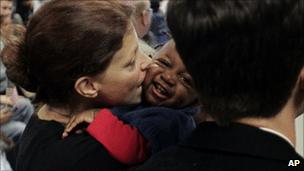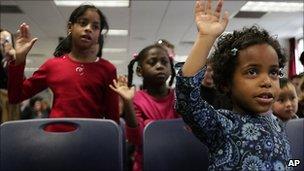Haitian children seek US citizenship after earthquake
- Published

Lisa Scoppa said it took Therline and Erikson months to adjust to US life
Haiti has had much heartbreak this year, from the devastating earthquake to the ongoing cholera epidemic. But in New York City, the BBC's Laura Trevelyan found only joy, as five adopted Haitian orphans became US citizens.
The citizenship ceremony held this week at the US citizenship and immigration services office in lower Manhattan was no ordinary one.
It was held specifically for children adopted by US parents, and among them were Haitians Therline, one, and Erikson, five, who had been in the process of adoption by Duke and Lisa Scoppa in January when the powerful earthquake struck, killing more than 200,000 people.
The Brooklyn couple first feared their children were dead, then learned they had been evacuated to Florida. Now, the children are US citizens.
"It's overwhelming," Mr Scoppa said, holding Erikson tightly.
"It's been a real rollercoaster," reflected his wife, as Therline smiled up at her.
"This ceremony has been an incredible experience, because it makes us feel as though it's real, we're finally validated as a family in a very official way."
Airlift to safety
I ask how the children had adjusted.
"After the first couple of months things got better, and now we're doing really well, we're so happy," Mrs Scoppa said.
Erikson still remembers the sound of the helicopter as it landed in the orphanage, and how loud it was as he was airlifted to safety, Mr Scoppa tells me.
Therline was only four months old when she came to live with the Scoppas, and weighed far less than she should. Now she's an engaging, chubby one-year-old.
Mr Scoppa worried about how Erikson would adjust to life in Brooklyn after Haiti, but he has learned English at the speed of light, says Mrs Scoppa, and now he is going to pre-kindergarden.
Erikson tries to open a present he has been given at the citizenship ceremony - a snow globe, he is thrilled to discover.
How does it feel to have provided these children with the chance of a new life?
"That's a heavy question," Mr Scoppa replied.
"We've thought about it a lot," explains his wife, "and adoption works both ways, especially because they have given us so much back."
Fortunes differ
A few miles away from the hope and pride of the citizenship ceremony in Manhattan, I meet Darlene Calixte in Brooklyn, who also dreams of bringing her children from Haiti to America.

The ceremony was held in November to mark National Adoption Month
In 2004, Ms Calixte left her five daughters with their grandmother in Port au Prince so she could come to New York and train as a nurse. Her intention was always to bring the girls here once she had established a new life for the family.
Then came January's earthquake. Ms Calixte's mother and the girls survived, but their home in the city's Delmas area was ruined, and now they live in what had been their back yard, sleeping under tarpaulin.
Ms Calixte can hardly speak about her children without crying.
"I feel like I want to die," she says softly. "As a mother, being parted from your children when they are living like that, with the ruins and the cholera, it's so hard."
She says she won't sleep in a bed until her children can.
"How can I sleep in this nice bed, lie down, relax, when they are outside in the yard? When rain comes down on them?"
Ms Calixte communicates with her children via text message all the time. "I love you Mummy, sleep well", reads one from 15-year-old Yvelandor.
Agony
The girls wake up in the middle of the night and text their mother when they are frightened - as they were when Hurricane Tomas passed over the island two weeks ago.
They talk to Ms Calixte about the dead neighbours they saw lying on the streets after the earthquake, and try to make sense of all they have experienced.
For Ms Calixte, living like this is agony. She is applying for her daughters to get visas so they can live here with her, but must prove to the US state department that she earns enough to support her family.
She does not want to go back to Haiti because she sees no life there for the girls.
Her goal is US citizenship for Yvelandor, Shayinor, Thayinor, Stephanior and Stephanie.
The earthquake has turned the lives of so many of Haiti's children upside down - Therline and Erikson now have a safe haven here, one Ms Calixte longs to offer her own girls.